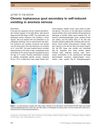 August 2013 in “Hospital Pharmacy”
August 2013 in “Hospital Pharmacy” Certain medications can cause serious side effects, including skin reactions, stroke, muscle disorders, tongue swelling, hair loss in women, and liver failure.
 6 citations,
May 2010 in “The Journal of Dermatology”
6 citations,
May 2010 in “The Journal of Dermatology” A woman with anorexia developed gout from self-induced vomiting.
 165 citations,
September 2003 in “Toxicology and applied pharmacology”
165 citations,
September 2003 in “Toxicology and applied pharmacology” Blocking COX, especially COX-2, in the skin can reduce inflammation and pain and may help prevent skin cancer.
 36 citations,
January 2018 in “Burns & Trauma”
36 citations,
January 2018 in “Burns & Trauma” NSAIDs may not affect soft tissue healing but should be used carefully for bone fractures and more research is needed to understand sex differences in response.
 26 citations,
February 2002 in “Urologic clinics of North America”
26 citations,
February 2002 in “Urologic clinics of North America” The document concludes that it's important to understand the placebo effect when evaluating the effectiveness of treatments in medical trials.
 1 citations,
January 2010 in “Elsevier eBooks”
1 citations,
January 2010 in “Elsevier eBooks” Any drug can cause skin reactions, but antibiotics, NSAIDs, and psychotropic drugs are more common, with some reactions being life-threatening.
 January 2019 in “Springer eBooks”
January 2019 in “Springer eBooks” Some chemicals and drugs can cause hair loss, which usually grows back after stopping the treatment.
8 citations,
January 2019 in “Nanomedicine” Egyptian researchers are advancing in pharmaceutical nanotechnology, potentially improving health outcomes and the economy.
5 citations,
April 2023 in “Pharmaceuticals” The new delivery system improved hair growth in alopecia treatment.
 1 citations,
July 2022 in “Pakistan biomedical journal”
1 citations,
July 2022 in “Pakistan biomedical journal” Transethosomes improve drug delivery through the skin by overcoming the outer skin layer's barrier.
 1 citations,
May 2022 in “Pharmaceutics”
1 citations,
May 2022 in “Pharmaceutics” Tea seed oil in nanostructured carriers stimulates hair growth and feels less greasy when applied.
 September 2024 in “International Journal of Applied Pharmaceutics”
September 2024 in “International Journal of Applied Pharmaceutics” A reliable method was developed to measure Finasteride and Tadalafil in rat blood.
 April 2024 in “AAPS PharmSciTech”
April 2024 in “AAPS PharmSciTech” New microneedle method improves hair regrowth treatment delivery.
 5 citations,
July 2006 in “Contact dermatitis”
5 citations,
July 2006 in “Contact dermatitis” Ammonium bisulfite in hair bleach can cause facial eczema.











